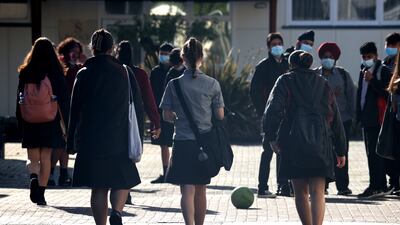There has been an unprecedented drop in maths, reading and science skills around the world in the aftermath of the Covid-19 pandemic, new rankings show.
Pupils aged 15 are less likely to be proficient in these three core disciplines than those tested a decade ago by the Programme for International Student Assessment (Pisa).
Overall, the UAE has maintained its position in the global education rankings, but pupils in the Emirates, as well as those in Saudi Arabia, scored less than the Organisation for Economic Co-operation and Development (OECD) average.
Pisa is an international assessment of the performance of 15-year-olds in reading, maths, and science carried out every three years. It was launched in 2000.
2022
“On average, the Pisa 2022 assessment saw an unprecedented drop in performance across the OECD,” the 2022 Pisa report says.
“Compared to 2018, mean performance fell by 10 score points in reading and by almost 15 score points in mathematics, which is equivalent to three-quarters of a year's worth of learning.
“The decline in mathematics performance is three times greater than any previous consecutive change.
“In fact, one in four 15-year-olds is now considered a low performer in mathematics, reading, and science on average across OECD countries. This means they can struggle to do tasks such as use basic algorithms or interpret simple texts.”
In 2022, close to 700,000 pupils from 81 OECD Member and partner economies, representing 29 million across the world, took the Pisa test. This edition was delayed by a year due to the pandemic.
Pisa scores act as a metric to compare quality, equity and efficiency in learning outcomes across countries.
“Results from Pisa 2022 show that some education systems coped better than others during and after pandemic-related school closures – and even learnt from the experience,” the report added.
While it is noted that “the Covid-19 pandemic seems an obvious factor that may have impacted results in this period,” the picture may not be so clear in some countries.
“In reading, for example, many countries such as Finland, Iceland, the Netherlands, the Slovak Republic and Sweden have seen students scoring lower marks for some time – in some cases for a decade or more,” the report continued.
“Educational trajectories were negative well before the pandemic hit. This indicates that long-term issues in education systems are also to blame for the drop in performance.”
How did pupils in the Middle East fare?
The latest Pisa study evealed that pupils in the Middle East continued to be outperformed by their peers in other developed countries.
In the UAE, average 2022 results were about the same as in 2018 in maths and science, and fell compared to 2018 in reading.
In maths, pupils assessed last year achieved average scores of 431, a drop of four points since 2018, the last time they were assessed.
For reading, pupils had an average score of 417, a drop of 14 points since the last test, while in science pupils had an average score of 432, a drop of two points.
In the UAE, 51 per cent of pupils achieved at least Level 2 proficiency in maths, significantly less than the average across OECD countries – 69 per cent.
Around 52 per cent of pupils in the UAE attained Level 2 or higher in reading, while the OECD average was 74 per cent.
And around 55 per cent of pupils in the country attained Level 2 or higher in science while the OECD average was 76 per cent.
In Saudi Arabia, average 2022 results were up compared to 2018 in maths, down in reading, and about the same in science.
Pupils in the kingdom achieved an average score of 389 in maths, an improvement of 16 points.
In reading, pupils in Saudi Arabia dropped by 17 points to 383.
In Qatar, average 2022 results were about the same as in 2018 in maths, and improved in reading and science. For reading, pupils improved by 12 points to 419.
In Jordan, average 2022 results fell compared to 2018 in maths, and stayed stable in reading and science.
Pisa 2022 is the first large-scale study to collect data on student performance, well-being, and equity before and after the Covid-19 disruptions.
Which countries have performed the best?
Singapore topped the world in maths, reading and science with average scores of 575 in maths, 543 in reading, and 561 in science. Pupils in the country improved by 10 points in science and six points in maths.
Singapore, Ireland and Japan were the top three countries for reading skills while Singapore, Japan and Macao had the highest average scores in science. Singapore, Macao, and Taiwan performed the best in maths.
“The report finds that in spite of the challenging circumstances, 31 countries and economies managed to at least maintain their performance in mathematics since Pisa 2018. Among these, Australia, Japan, [South] Korea, Singapore, and Switzerland maintained or further raised already high levels of student performance, with scores ranging from 487 to 575 points,” the report added.









